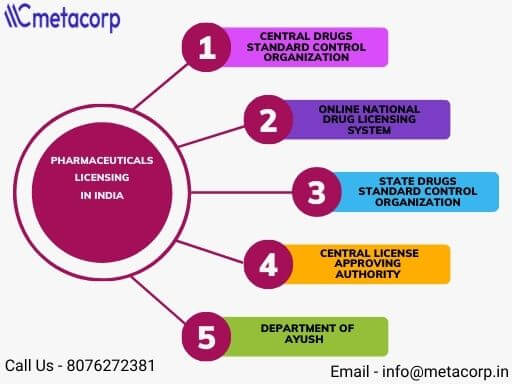
The Drugs Manufacturing License is a critical authorization granted by regulatory authorities to ensure that pharmaceutical products are produced in compliance with established standards of safety, quality, and efficacy. In India, the licensing framework is governed by the Drugs and Cosmetics Act, 1940 and the associated Rules, 1945, which lay down stringent guidelines for the manufacture, distribution, and sale of drugs and cosmetics across the country.
This license acts as a regulatory safeguard, ensuring that only those facilities that meet the necessary infrastructural, technical, and procedural requirements are permitted to produce pharmaceutical formulations or bulk drugs. The issuance of a drug manufacturing license not only legitimizes the operations of a pharmaceutical manufacturer but also holds them accountable to adhere to Good Manufacturing Practices (GMP) as outlined under Schedule M of the Act.
Drugs manufacturing licenses are issued by the State Licensing Authority (SLA) for conventional pharmaceutical products and by the Central Drugs Standard Control Organization (CDSCO) for drugs falling under central jurisdiction—such as vaccines, blood products, and biotech-based formulations. Whether for a large-scale pharmaceutical corporation or a smaller loan license holder, securing a drug manufacturing license is the foundational step in entering the regulated pharmaceutical market in India.
This licensing regime plays a pivotal role in safeguarding public health by ensuring that medicines reaching consumers are manufactured in a controlled and legally compliant environment. It serves not only as a regulatory requirement but also as a mark of credibility and assurance in the highly sensitive and competitive pharmaceutical industry.
A drugs manufacturing license is a legal authorization granted to companies or individuals allowing them to produce pharmaceutical products for commercial use. This license ensures that drug manufacturing complies with standards related to quality, safety, efficacy, and good manufacturing practices (GMP).
The Central Drugs Standard Control Organization (CDSCO) is India’s national regulatory authority operating under the Ministry of Health and Family Welfare. It plays a critical role in ensuring the safety, efficacy, and quality of drugs manufactured and distributed across the country. CDSCO is primarily responsible for granting drug manufacturing licences in the following areas:
Licensing for New Drugs and Vaccines
Licensing of High-Risk Drug Categories
Import and Export Permissions for Pharmaceuticals
Clinical Trial Approvals and Biosimilar Regulation
The Online National Drug Licensing System (ONDLS) is a centralized digital platform developed to facilitate paperless, faster, and more transparent drug licensing and registration processes across India. It integrates various stakeholders in the pharmaceutical regulatory ecosystem, including CDSCO, State Licensing Authorities (SLAs), manufacturers, importers, and exporters.
Unified Digital Platform for Licensing
In India, the manufacturing, distribution, and sale of drugs are strictly regulated under the Drugs and Cosmetics Act, 1940 and its associated Rules. To ensure public health and safety, any individual or entity engaged in the pharmaceutical business—whether manufacturing, marketing, or retail—must obtain the appropriate drug license from the relevant regulatory authority.
1. Manufacturing License
Issued to businesses engaged in the manufacturing of drugs, including allopathic, ayurvedic, homeopathic, and unani medicines.
Granted by the State Drug Control Authority, subject to compliance with Good Manufacturing Practices (GMP) under Schedule M.
Required for both bulk drug production and formulations.
2. Sale License
This category is further divided into:
a) Wholesale Drug License
b) Retail Drug License
3. Loan License
4. Import License
5. Multi-Drug License
Under the Drugs and Cosmetics Act, 1940, the responsibility for regulating the manufacture, sale, import, and distribution of drugs in India is shared between central and state regulatory authorities. These authorities are empowered to issue drug licenses, ensure quality compliance, and enforce drug laws to safeguard public health.
Below are the key drug regulatory authorities in India:
1. State Drugs Standard Control Organization (SDSCO)
2. Central Drugs Standard Control Organization (CDSCO)
CDSCO is the national regulatory authority functioning under the Ministry of Health and Family Welfare.
It oversees:
3. State Drug Licensing Authority with Approval of Central License Approving Authority (CLAA)
4. Department of AYUSH (Ayurveda, Yoga & Naturopathy, Unani, Siddha, and Homoeopathy)
For more details, please click Metacorp Drugs Licensing Services





We are the pioneers in offering environmental consulting services to our patrons, giving us the first mover advantage & keeping us ahead of our competitors.
Very experienced in filing, monitoring & submission of CDSCO Compliances, Drugs Manufacturing & sale guidelines, Environmental Impact Assessment, AERB consulting services, Pollution Control Board CTE & CTO Advisory Services, Waste Management Authorization from State Pollution Control Boards, Fertilizers & Insecticides Manufacturing, Wholesale & Import Compliances
